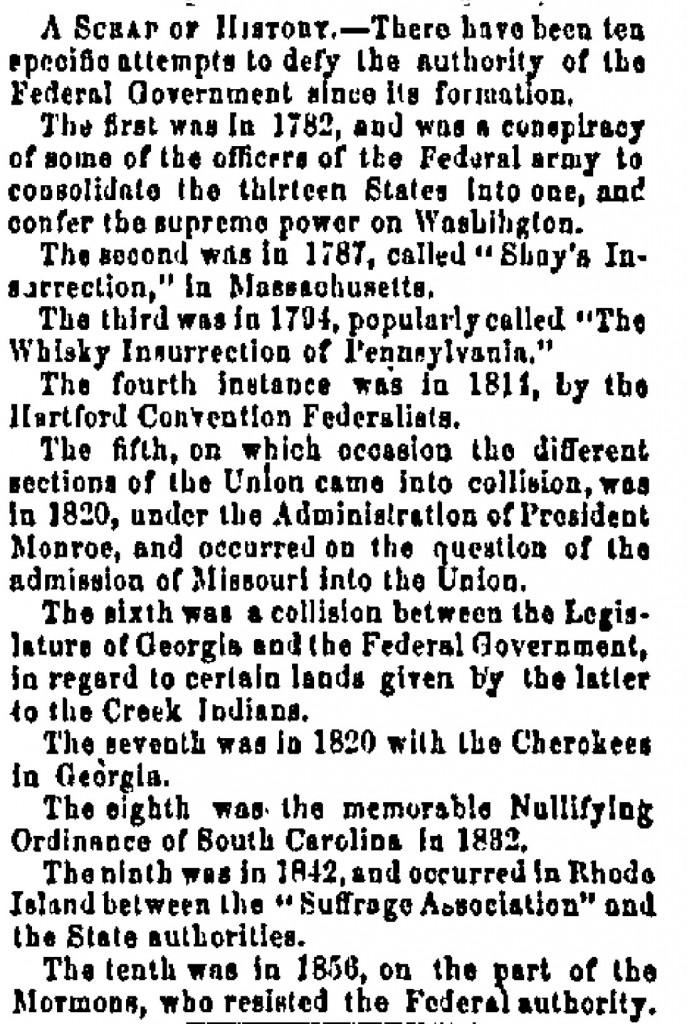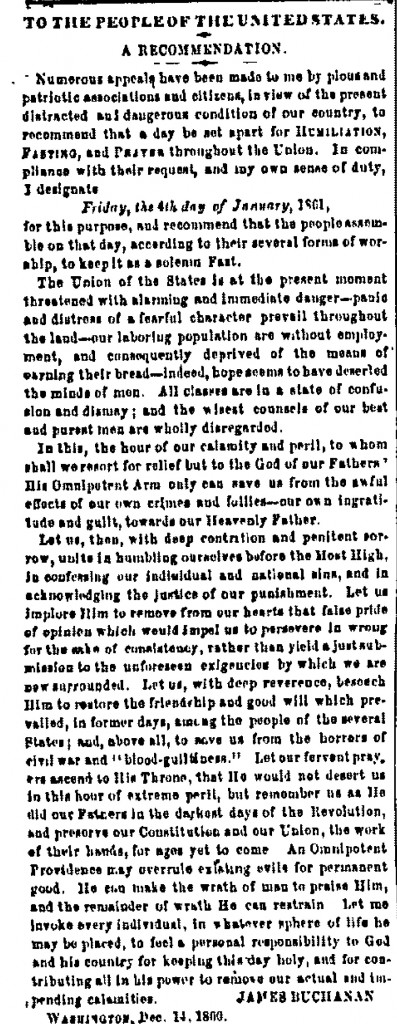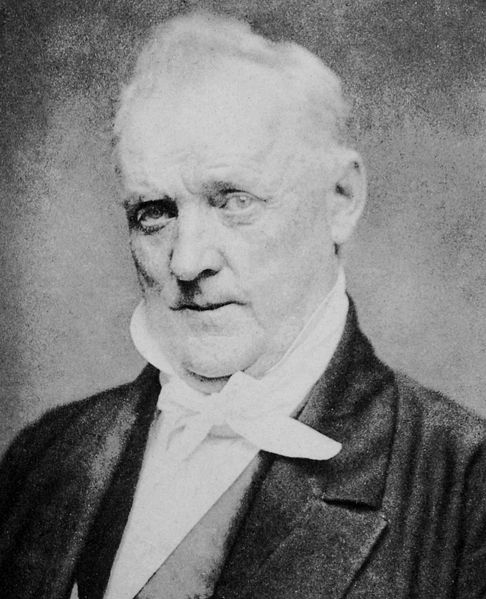Christmas Eve 1860
Posted By Norman Gasbarro on December 24, 2010
The Harrisburg Patriot, a weekly newspaper in 1860, published its last edition before Christmas on 20 December. The first four pages were crammed with news of impending crisis. There was very little social, economic, agricultural, or personal news.
One article pointed out that the country had been in this state before – in fact, ten times before – and cited the examples of specific attempts to defy the federal government:
A SCRAP OF HISTORY – There have been ten specific attempts to defy the authority of the Federal Government since its formation.
The first was in 1782, and was conspiracy of some of the officers of the Federal army to consolidate the thirteen States into one, and confer the supreme power on Washington.
The second was in 1787, called “Shay’s Insurrection,” in Massachusetts.
The third was in 1794, popularly called “The Whiskey Insurrection,” of Pennsylvania.
The fourth instance was in 1814, by the Hartford Convention Federalists.
The fifth, on which occasion the different sections of the Union came into collision, was in 1820, under the Administration of President Monroe, and occurred on the question of the admission of Missouri into the Union.
The sixth was a collision between the Legislature of Georgia and the Federal Government in regard to certain land given by the latter to the Creek Indians.
The seventh was in 1820 with the Cherokees in Georgia.
The eighth was the memorable Nullifying Ordinance of South Carolina in 1832.
The ninth was in 1842, and occurred in Rhode Island between the “Suffrage Association” and the State authorities.
The tenth was in 1856, on the part of the Mormons, who resisted the Federal authority
Today, in retrospect, comparing any of the above seemingly minor instances to the great crisis of secession seems foolish. The rhetoric expressed in the articles printed in that same edition of the Patriot pointed out the deep division even among the people of the same political party.
One opinion declared that the Republican Party leaders – Lincoln, Seward, and Sumner – represented an extreme view, and that South should not fear any of their proposed actions, as the minority within the party would have to bend to the majority.
The way to check disunion is to allay the apprehensions of the South, by showing them that LINCOLN, SEWARD, SUMNER, and other leaders of the Republican party, are not the true exponents of Northern sentiment.
Another opinion seemed to suggest that the same was true of the South – that there was a “class of men… not truly representing the Southern people, who are ready to ruin, if they cannot rule.” These men, “live by Localism… and are so forgetful of their loyalty that they seem ready to gratify their selfish ambition among the very ruins of the Republic.”
President James Buchanan, sensing the changing climate since his message of about a month before, had issued “a recommendation” on 14 December 1860:
TO THE PEOPLE OF THE UNITED STATES
A RECOMMENDATION
Numerous appeals have been made to me by pious and patriotic associations and citizens, in view of the present distracted and dangerous condition of our country, to recommend that a day be set apart for HUMILIATION, FASTING, and PRAYER throughout the Union. In compliance with their request, and my own sense of duty, I designate Friday, the 4th day of January, 1861, for this purpose, and recommend that the people assembled on that day, according to their several forms of worship, to keep it as a solemn Fast.
The Union of the States is at the present moment threatened with alarming and immediate danger – panic and distress of a fearful character prevail throughout the land – our laboring population are without employment, and consequently deprived of the means of earning their bread – indeed, hope seems to have deserted the minds of men. All classes are in a state of confusion and dismay; and the wisest counsels of our best and purest men are wholly disregarded.
In this, the hour of our calamity and peril, to whom shall we resort for relief but to the God of our Fathers. His Omnipotent Arm only can save us from the awful effects of our own crimes and follies – out own ingratitude and guilt, towards our Heavenly Father.
Let us then, with deep contrition and penitent sorrow, unite in humbling ourselves before the Most High, in confessing our individual and national sins, and in acknowledging the justice of our punishment. Let us implore Him to remove from our hearts that false pride of opinion which would impel us to persevere in wrong for the sake of consistency, rather than yield a just submission to the unforeseen exigencies by which we are now surrounded. Let us, with deep reverence, beseech Him to restore the friendship and good will which prevailed, in former days, among the people of the several States; and above all, to save us from the horrors of civil war and “blood-guiltiness.” Let our fervent prayers ascend to His Throne, that He would not desert us in this hour of extreme peril, but remember us as He did our Fathers in th3 darkest days of the Revolution, and preserve our Constitution and our Union, the work of their hands, for ages yet to come. An Omnipotent Providence may overrule existing evils for permanent good. He can make the wrath of man to praise Him, and the remainder of wrath He can restrain. Let me invoke every individual, in whatever sphere of life he may be placed, to feel personal responsibility to God and his country for keeping this day holy, and for contributing all in his power to remove our actual and impending calamities.
JAMES BUCHANAN, Washington, Dec. 14, 1860
James Buchanan was born in 1791 near Mercersburg, Franklin County, Pennsylvania, about 75 miles southwest of Harrisburg. He was educated at Dickinson College, just across the river from Harrisburg. He made his home in Lancaster at a place he called “Wheatland.”
On this Christmas Eve of 1860, it appeared that no measure of reason could prevent war. While the president hoped that his day of prayer would result in the intervention of Providence, it was not to be. Abraham Lincoln‘s election, with virtually no votes from any of the eleven southern states that would end up seceding to form the Confederacy, proved to be the last straw. The Harrisburg Patriot reported, for the first time, the national popular vote – in this, the last edition published before Christmas Day.
Total against Lincoln…………. 2,844,151
Total for Lincoln………………. 1,865,176
Majority against Lincoln……. 973,975
Lincoln had clearly won the electoral vote, but the way the results were presented by the Patriot seemed to indicate that the public should not be pleased with the results. But in Pennsylvania, the combined popular votes for Douglas, Breckinridge and Bell did not exceed those for Lincoln and some areas of the state clearly voted a majority for Douglas.
What the Harrisburg Patriot could not report in its 20 December 1860 edition because it happened later in the day, was that South Carolina would secede from the Union. This compounded the crisis and made this Christmas eve worrisome for many. Still, war and the consequences of it were probably not thought of as the inevitable outcome.
When his presidency was over in March 1861, and with the country about to go to war, James Buchanan retired to “Wheatland” where he remained until his death on 1 June 1868.
Photo of James Buchanan from Wikipedia. News articles from the Harrisburg Patriot, 20 December 1860 as obtained from the Free Library of Philadelphia on-line resources.
 ;
;





Comments